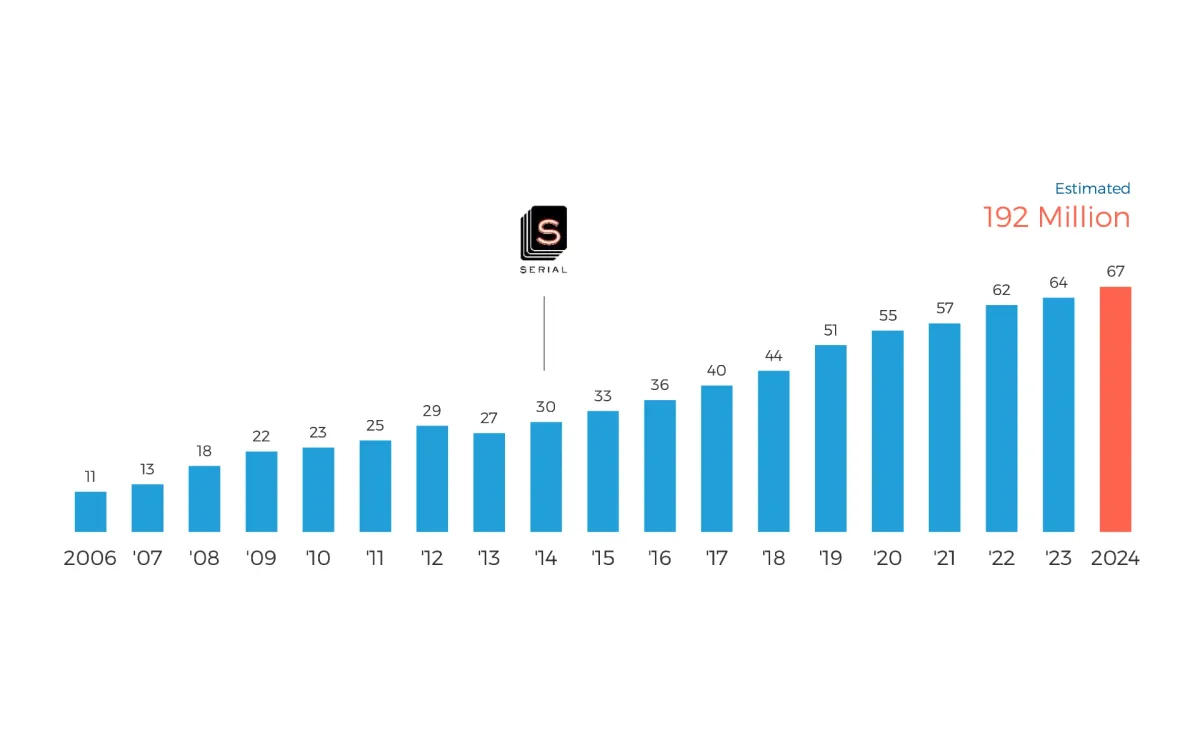
A comprehensive study released in May 2024 by Edison Research and Audiochuck reveals significant growth in true crime podcast listenership, with the genre emerging as a powerful force for victim advocacy and case resolution. According to the True Crime Consumer Report, the number of weekly true crime podcast listeners in the United States has nearly tripled over five years, climbing from 6.7 million listeners in 2019 to 19.1 million in 2024.
The research, based on 3,148 online interviews conducted between May 10-31, 2024, indicates that 84% of the U.S. population aged 13 and older, approximately 230 million Americans, consume true crime content across various media platforms. While television remains the dominant medium with 68% viewership, podcasting has established itself as a significant platform, capturing 22% of true crime consumers.
The study's methodology incorporated data weighted to match U.S. population demographics for gender, age, and ethnicity, supplemented by 24 in-depth interviews with both podcast listeners and non-listeners. This approach provides a comprehensive view of true crime content consumption patterns and their societal impact.
True crime podcasting has evolved beyond entertainment, fostering active audience engagement in criminal investigations. According to the research, podcast listeners are 4.4 times more likely to provide tips for case resolution compared to non-podcast consumers. This heightened involvement has led to tangible results, as evidenced by the case of James Reyos, where Crime Junkie listeners' interventions led to the discovery of crucial untested evidence forty years after his arrest.
The genre's influence extends to charitable giving, with true crime podcast listeners showing 3.6 times higher likelihood of donating to related causes compared to non-podcast consumers. This increased advocacy has translated into substantial financial support, with Audiochuck alone contributing $8.5 million to over 150 non-profit organizations.
The research identifies murder cases (65%), serial killers (60%), and cold cases (55%) as the most compelling topics for true crime consumers. However, the appeal extends beyond sensationalism, with 49% of listeners expressing interest in the psychological aspects of criminal behavior and 48% in forensic science applications.
The study reveals a significant shift toward victim-centered storytelling, with 77% of true crime podcast listeners showing increased interest in content that prioritizes victims' perspectives. This approach, defined in the report as "responsible and mission-driven storytelling that serves the victim, their loved ones, and the communities they represent," marks a notable evolution in true crime content creation.
True crime podcasting has established itself as the third most popular podcast genre, following comedy and society & culture. This positioning reflects broader changes in media consumption patterns, with podcast listenership among the U.S. population aged 12 and older reaching 67% by 2024, representing approximately 192 million Americans.
The genre's growth potential remains substantial, with 41% of current true crime consumers who do not listen to podcasts expressing interest after exposure to sample content. This represents a potential audience of 112 million Americans, suggesting continued expansion opportunities for the medium.
The impact of true crime podcasting extends beyond audience metrics, fostering a more engaged and socially conscious form of true crime consumption. Listeners demonstrate higher rates of case-related activism, with 55% sharing cases to promote awareness, compared to 30% among non-podcast consumers.
The findings underscore true crime podcasting's transformation from a niche entertainment format to a significant force in criminal justice advocacy and victim support, setting new standards for responsible true crime content creation and audience engagement.

